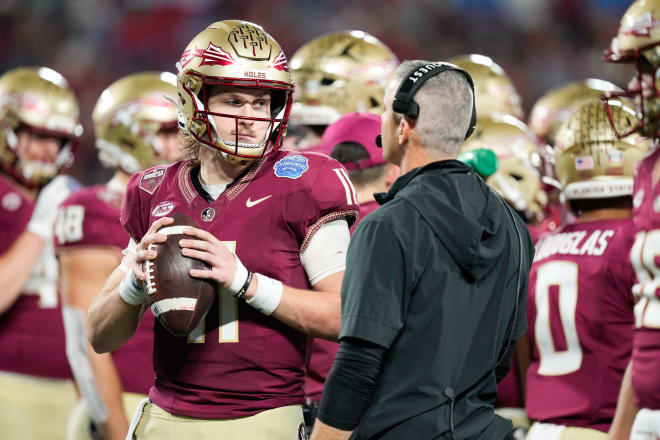FSU set to further test helmet comms system in first spring scrimmage

Asked last October in the wake of the Michigan sign-stealing scandal about his thoughts on instituting helmet communication systems with players, Mike Norvell admitted he's a bit wary of bringing this NFL technology into the college game.
He said he knows how strict the NFL's rules are with the headsets and that he values there being an inherent advantage in how well a coach prepares his players for gameday instead of a battle to see how much information a coach can instill into his quarterbacks during that headset period before plays.
The rest of college football seems confident that these rules will be well enforced, however, as the NCAA permitted the use of coach-to-player helmet communication systems in a few bowl games last November. Earlier this month, the NCAA Football Rules Committee proposed a rule that helmet communication systems will be eligible for use in all FBS games. If the NCAA Playing Rules Oversight Panel approves the submitted rule change in April, it would go into effect starting this fall.
Whatever his personal feelings may be, Norvell is not going to willfully forgo an advantage or an opportunity to stay with the times technologically speaking. As such, FSU has begun using the coach-to-player helmet communication systems at practice this spring.
Thursday's first spring scrimmage will be a big step forward in this regard as it's the first time FSU's coaches communicate through helmets and huddles instead of sideline signals in a true game setting.
"We're trying to implement that as much as possible throughout the course of practice. We'll see what communication is good, what's too much, too little, how much we want to use it. There may be times where we might not," Norvell said Tuesday before the scrimmage. "We're going to go from there and continue to try and utilize and focus on different things within that communication. We have the rest of spring to kind of play with it. Obviously, fall camp, we'll hone down on how we use it."
The technology FSU is testing out this spring is the same as what is currently used in the NFL. It is a small orange speaker on the inside of the front of the helmet, which allows coaches to talk directly to players between plays.
This communication is done via walkie-talkies. Norvell has one paired with the quarterbacks and FSU defensive coordinator Adam Fuller has one paired with linebackers (one on the field at any given time) who also have the helmet speakers, to communicate play calls or adjustments until up to 15 seconds are left on the play clock (at which time the speakers stop working).
This also has made FSU adjust to using a huddle so that the quarterback/linebacker can relay a play call to the rest of the players on the field.
"The headset, it was super weird at first. It's hard to hear Coach at times, especially when he's yelling. It's been very beneficial to all of us in the room," redshirt freshman quarterback Brock Glenn said. "The huddle adds a good element to the game, it gives us a tactical advantage. It's been great during practice as well because Coach can give us tips and thoughts and reminders pre-snap and after a play is over. Instead of running all the way over to him, he can just tell us, 'Hey Brock, do this, that and that.' We can communicate that way so it's helped us tremendously."
Part of this tinkering process also has entailed plenty of conversations with people who have prior experience with this helmet communication technology and what times/situations are best for it.
Norvell didn't name any names, but he did say he's talked a few people who have experience coaching both in college as well as the NFL to get their insights and build a greater understanding of how this technology can be best utilized.
"I do (like it). I really do. I think it also, selfishly being a quarterback guy, allows you to have a little bit more access to the quarterback in the game situation," FSU quarterbacks coach Tony Tokarz said. "You can give that last-minute reminder, that last-minute tip whereas in years past, you can't just scream from the sideline and have them hear you with 85,000 people in the stands...
"It's a constant work in progress. It's an adjustment, or an addition I guess, for the players, but for us as coaches, we've got to figure out that fine line between how much information or when to give information, not just a play call. And at the same time, how do the guys respond to it? Because each guy is a little bit different in how much they can take, how much they can handle on it. Overall, I think it's going to be a good tool and we'll keep working with it."
Follow The Osceola on Facebook
Follow The Osceola on Twitter
Subscribe to the Osceola's YouTube channel
Subscribe to the Osceola's podcasts on Apple